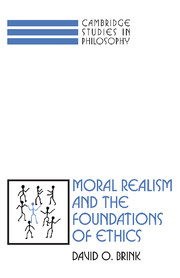Book contents
- Frontmatter
- Contents
- Preface
- 1 INTRODUCTION
- 2 MORAL REALISM AND MORAL INQUIRY
- 3 EXTERNALIST MORAL REALISM
- 4 DOES MORAL REALISM MATTER?
- 5 A COHERENTIST MORAL EPISTEMOLOGY
- 6 MORAL REALISM AND THE IS/OUGHT THESIS
- 7 A POSTERIORI OBJECTIONS TO MORAL REALISM
- 8 OBJECTIVE UTILITARIANISM
- Appendix 1 Must an infinite regress of justification be vicious?
- Appendix 2 Coherence, internalism, and externalism in epistemology
- Appendix 3 The is/ought thesis and intuitionism
- Appendix 4 Rawlsian constructivism
- Bibliography
- Index
Appendix 3 - The is/ought thesis and intuitionism
Published online by Cambridge University Press: 11 January 2010
- Frontmatter
- Contents
- Preface
- 1 INTRODUCTION
- 2 MORAL REALISM AND MORAL INQUIRY
- 3 EXTERNALIST MORAL REALISM
- 4 DOES MORAL REALISM MATTER?
- 5 A COHERENTIST MORAL EPISTEMOLOGY
- 6 MORAL REALISM AND THE IS/OUGHT THESIS
- 7 A POSTERIORI OBJECTIONS TO MORAL REALISM
- 8 OBJECTIVE UTILITARIANISM
- Appendix 1 Must an infinite regress of justification be vicious?
- Appendix 2 Coherence, internalism, and externalism in epistemology
- Appendix 3 The is/ought thesis and intuitionism
- Appendix 4 Rawlsian constructivism
- Bibliography
- Index
Summary
One reason many have thought an is/ought thesis is fatal to moral realism is that they have claimed or assumed that foundationalism is true. Foundationalism and the is/ought thesis, many think, force us to choose between intuitionism and antirealism. But intuitionism is absurd: It is implausibly committed to the existence of a special faculty for the perception of moral facts, it is embarrassed by the existence of moral disagreements, and it is committed to the mysterious doctrine of nonnaturalism. Because the is/ought thesis forces us to choose between intuitionism and antirealism, and because intuitionism is absurd, we should reject moral realism and accept some form of noncognitivism.
There are at least three things wrong with this use of the is/ought thesis against moral realism. First, intuitionism is not absurd; it is no less plausible than foundationalism is generally. We saw in 5.3 that intuitionism is not committed to the existence of special faculties of moral perception and that intuitionism need not be embarrassed by the existence of moral disagreement. In Chapter 6 we saw that the is/ought thesis implies nonnaturalism only if the semantic test of properties is true, and we raised doubts about the semantic test of properties. If we reject the semantic test of properties, neither the is/ought thesis nor a foundationalist epistemology requires rejection of ethical naturalism. But even if the semantic test of properties is true, nonnaturalism is not absurd, because in that case the facts and properties of any discipline will be sui generis.
- Type
- Chapter
- Information
- Moral Realism and the Foundations of Ethics , pp. 301 - 302Publisher: Cambridge University PressPrint publication year: 1989



